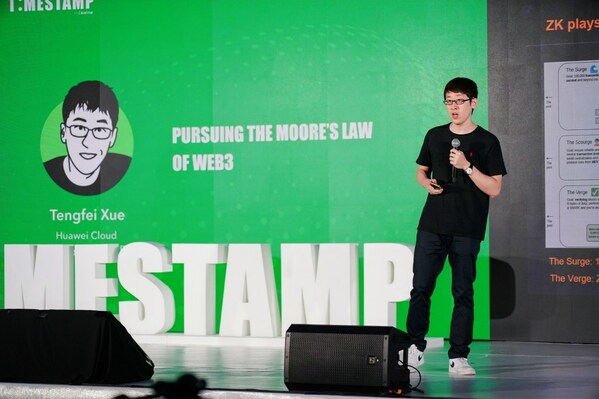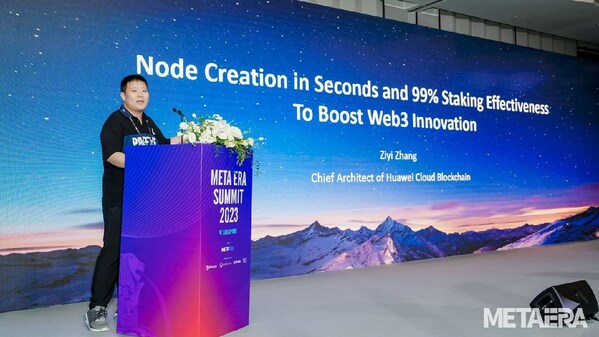SINGAPORE, Sept. 13, 2023 /PRNewswire/ — Token2049, Asia’s influential Web3 event, was held in Singapore from September 10 to 15. During the event, Huawei Cloud showcased staking node engine, confidential computing, and ZK rollup and discussed the future of the Web3 industry with top vendors, builders, and developers. Huawei Cloud also expressed their commitment to accelerating Web3 innovation with leading technologies.
Minute-level ZK Rollup Average Transaction Confirmation Time for Efficient ZK Running Environment
In TimeStamp2023 session held on September 11, Xue Tengfei, Huawei Cloud Web3 Technical Planning Expert, shared Huawei Cloud’s innovative attempts in ZK hardware acceleration. With Huawei-developed XPUs, system-level architecture innovation, and optimized algorithms, the average transaction confirmation time of ZK rollups is expected to plummet from hours to minutes.
Xue Tengfei, Huawei Cloud Web3 Technical Planning Expert
Xue Tengfei said, “We believe that the significant reduction in the transaction confirmation time of ZK rollups will pave the way for the large-scale use of Web3 applications. It will not only improve the performance and scalability of blockchains, but also provide more possibilities for industries and application scenarios.”
Huawei Cloud QingTian Enclave Safeguards Transactions
On September 12, in Blockchain Security Alliance Meetup initiated by the Blockchain Security Alliance, Zhang Ziyi, Chief Architect of Huawei Cloud Blockchain, introduced innovative technologies provided by Huawei Cloud. He presented Node Engine Service (NES) for Ethereum staking node hosting, QingTian Enclave security framework, and ZK rollup hardware acceleration.
Zhang Ziyi said, “Web3 project participants can access NES to host their public blockchain nodes in an easy, stable, reliable, and efficient way. By now, service providers of blockchain data, wallets, and DApps have started their journey with NES.”
In addition, Jia Xiaoqiang, Director of Huawei Cloud Virtualization Products, introduced Huawei Cloud’s Web3 solution aiming to secure systems, applications, and sensitive data in wallet scenarios.
Jia Xiaoqiang said, “Huawei Cloud QingTian Enclave confidential computing solution is just like a safe for wallet private keys. It supports environment and identity authentication and full-link data encryption and decryption. Applications and data can be run with protection on Huawei Cloud Elastic Cloud Servers (ECSs). Unauthorized users and third parties are isolated to maintain transaction security of private keys and wallets.”
IPFS Cloud Data Ecosystem with Tenfold Rewards
At the Fil Dev Summit on September 12, Bai Tao, Chief Cloud Storage Solution Architect of Huawei Cloud, shared InterPlanetary File System (IPFS) data service and elastic cloud deployment solution jointly developed by Huawei Cloud and partners. Huawei Cloud, with over 18 years of experience in enterprise-level storage, aims to deliver cloud storage services that are not only cost-effective but also highly efficient.
Bai Tao said, “Huawei Cloud’s cloud data entry simplifies the process of storing data on IPFS, resulting in a 10-fold increase in data rewards and reduced data storage overhead for enterprises. Additionally, Huawei Cloud’s large-ratio EC technologies enable 91% effective capacity usage of disks and scalable storage for data up to 10 EB-level. With the elastic cloud deployment solution, users can choose offline encapsulation, cloud verification, or end-to-end cloud deployment.”
Node Creation in Seconds, 99% Staking Effectiveness: Unlocking Web3 Performance
On September 12, Zhang Ziyi shared more about Huawei Cloud NES at MetaEra Summit during Token 2049.
Zhang Ziyi, Chief Architect of Huawei Cloud Blockchain
Zhang Ziyi said, “NES comes together with Huawei Cloud’s homegrown innovative algorithms. Users can thus enjoy up to 99% staking effectiveness and higher rewards using NES.” Currently, Huawei Cloud’s hosting service of staking nodes has been launched on their website and is open for OBT.
Providing “Everything as a Service”, Huawei Cloud aims to offer robust infrastructure that enables advanced, distributed computing power for Web3. This commitment extends to building an open, efficient, and secure blockchain platform that can foster innovation in the Web3 ecosystem.





